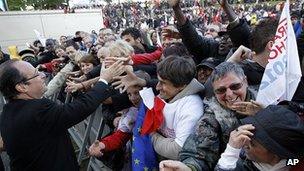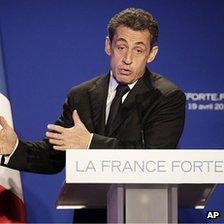France elections: Campaign crescendo
- Published
- comments

Victory for Francois Hollande would end 17 years of centre-right presidential rule
By the end of the day campaigning in the French elections will cease. President Sarkozy will hold his final rally in Nice before voting begins on Sunday in the first round.
The president is the underdog. The polls are against him. He remains defiant, rounding on the media - what he calls "the Parisian caviar left" - for writing him off. He has a stubborn belief in the good sense of the silent majority. But within his camp the doubts are showing.
Francois Hollande - the Socialist candidate - is counting down the clock. That's how it seems. He sticks to his message without taking risks.
I am always struck how much time Mr Hollande has. After a campaign rally he likes to hang around, to meet, talk and yes, to laugh. I once asked him a question about the City of London and he threw back his head and chuckled before answering.
He describes himself as Mr Normal, and therein lies part of his success so far. He sells himself as the French everyman, a leader France could feel comfortable with after the hyperactive President Sarkozy. Every poll has him winning in the second round. Last night I asked him whether he'll win. "I'm not certain", he told me, "but it's possible".
He's a Socialist who will stand up to the financial markets, squeeze the rich and favour growth over austerity.
President Sarkozy has struggled to lay a glove on him. I have heard his supporters call Hollande "Flamby" - a brand of wobbly caramel pudding. Privately the French president thinks he's useless.
Budget concerns

Mr Sarkozy has toned down the "bling bling" trappings of the presidency
Sarkozy's most recent line of attack is to warn that Hollande will engage in a festival of spending. Francois Hollande's appeal is that he offers to save the French dream, to protect the French way of life.
President Sarkozy's difficulty is that the economy is stagnant and unemployment is at 10%. In the past month when I have visited factories and offices I have asked what is the main issue. Unemployment always comes top.
The president's other problem is that he is forever trying to rebrand himself. Hollande calls him "Mr Zigzag".
There is, however, less restlessness with the president these days. He has always been a champion of success but the image persists of a "bling bling" presidency. These days his wife Carla Bruni insists "we are just modest people".
For all that the campaign has an air of unreality. No candidate really talks about the debt crisis or the spending cuts that surely will have to come, or the changes to the welfare system that must follow. There are no votes in austerity, it seems.
What the electorate seems to prefer is bashing the financial markets - and all the candidates have tapped into that.
I listened to the far right candidate Marine Le Pen the other night raging against liberal capitalism. And the far left candidate Jean-Luc Melenchon, who calls for a citizens' uprising, can't wait for the chance to confiscate all earnings above 350,000 euros.
The other message from France is a disillusionment with globalisation and supranational institutions like the EU. The French believe that system has failed to protect jobs. Those institutions are seen as the projects of an elite, and ordinary people are unconvinced they are on their side.
A quarter of voters say they have yet to make up their minds. President Sarkozy really needs to win the first round on Sunday to get some momentum. His camp believe their best card is that the president has been tested in a crisis, while his main opponent has never been in government.
Europe is holding its breath. For if Francois Hollande wins, France will have a president who believes that the debt crisis can only be fought with more growth and not more austerity. Berlin, which has set the narrative in the past year, will face a challenge.